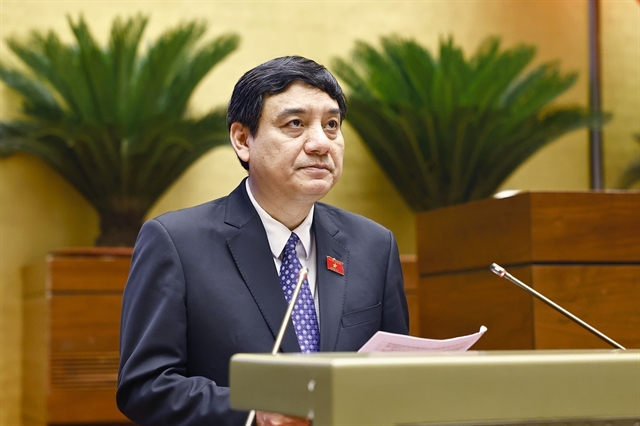 Politics & Law
Politics & Law


|
| Member of the National Assembly Standing Committee Nguyễn Đắc Vinh presents a report explaining and revising the draft Law on Teachers. — VNA/VNS Photo Doãn Tấn |
HÀ NỘI — The National Assembly (NA) on Tuesday morning discussed the revised draft Law on Teachers, with details on hiring and retiring policies, within its continuing ninth session.
NA Standing Committee member Nguyễn Đắc Vinh said that the draft law clearly defined teachers’ rights and obligations, along with their rights and obligations in public educational institutions and in non-public educational institutions.
Incorporating opinions of NA deputies, the draft law supplements at Point b, Clause 2, Article 8 the teachers’ rights to participate in the management and operation of enterprises established by higher education institutions in the field of scientific development, technology application and transfer.
The content is consistent with the NA’s Resolution No 193/2025/QH15 issued on February 19 this year on piloting special mechanisms and policies to create breakthroughs in science, technology, innovation and national digital transformation.
Vinh believed that the regulation that organisations and individuals were not allowed to spread inaccurate information about teachers was necessary to protect the teachers’ reputation and image, while waiting for official opinions or conclusions from competent authorities.
The NA Standing Committee found that it was needed to delegate the recruiting authority to the education sector, creating conditions for the sector to be proactive in using, managing and developing teachers.
It would meet the requirements on the sector quantity, structure and quality; overcoming shortage and imbalance in teacher structure.
The draft law was also adjusted to recruiting teachers according to the level of education and training. For schools of the people's armed forces, teacher recruitment would be regulated by the Minister of Public Security and the Minister of National Defence.
The Government would be assigned to specify in detail contents related to teacher recruitment in public educational institutions and foreign teachers.
The draft law stipulates that teachers' salaries are ranked highest in the administrative career salary scale system and have additional allowances depending on their work and region. More details will be specified by the Government.
The draft law supplements a policy to support housing rent, equal to the rent for public housing, in cases where public housing or collective housing cannot be arranged for teachers.
Regarding the retirement regime for teachers, some deputies suggested allowing preschool teachers to retire early, because this is under the authority of the Government according to the Labour Code.
The NA Standing Committee replied that currently, preschool teachers were not considered to be working in arduous, toxic, or dangerous industries and occupations.
But preschool teachers have to perform specific tasks with great pressure on work and working hours. When they are old, it will be difficult to complete their tasks, according to the commitee.
Therefore, many NA deputies and relevant agencies agreed to reduce the retirement age for preschool teachers with the regimes as stipulated in the draft law.
The NA Standing Committee believed that it was necessary and reasonable to stipulate that teachers with high qualifications, academic titles and degrees, and teachers working in specific specialised fields could have their working time extended and retire at an older age in order to take advantage of high-quality human resources.
It would also help overcome the shortage of highly qualified teachers in specific specialised fields that the country needs.
The draft law regulates conditions to realise the policy when educational institutions are in need, teachers are healthy enough and want to voluntarily extend their working time.
At the same time, it adds detailed criteria for teachers to meet the standards and conditions of educational institutions. — VNS